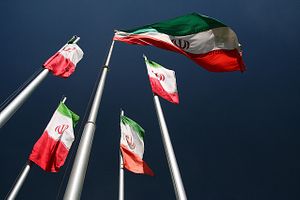Turkmenistan and Iran, it seems, are intent on not letting an ongoing gas dispute completely derail relations. On March 27, Iranian President Hassan Rouhani paid a visit to Ashgabat, shaking hands with Turkmen President Gurbanguly Berdimuhamedov. Beyond the bilateral relationship, the visit reflects Iran’s preparations for an uncertain future vis-a-vis the United States.
According to the Iranian Foreign Ministry, the two leaders oversaw the signing of 13 agreements covering a wide array of bilateral fields, from culture, arts and education to customs, agriculture, and aviation. The main topic of interest for both Tehran and Ashgabat, however, was energy.
Back in January 2017, Iran claimed Turkmenistan’s state gas company, Turkmengaz, had cut gas supplies to northern Iran, violating a 20-year agreement. The spat was sparked by Turkmen claims that Iran had neglected to pay back a debt of $2 billion. More recent reports cite the figure as $1.5 billion.
As I noted in a piece for The Diplomat Magazine in January, as 2017 closed, it looked like the two countries would move to international arbitration to settle the dispute. At the end of January Reuters reported, “Tehran is ready to file a case with the International Court of Arbitration (ICA) over the quality and price of gas it receives from Turkmenistan.”
While both Iran and Turkmenistan have declared their willingness to take the dispute to arbitration, it’s not clear that they have actually taken such steps.
It doesn’t look like the two sides are letting the dispute get in the way of all business. According to the Iranian Foreign Ministry, Rouhani mentioned discussions on a gas swap arrangement and energy cooperation in the Caspian Sea.
As Eurasianet noted, gas swaps are not new:
Just as the gas debt dispute was first raging last year, an NIGC [National Iranian Gas Company] official told media that Turkmenistan was still hoping to strike more swap deals to supply Azerbaijan and Armenia with up to 15 million cubic meters of gas daily via Iranian pipelines.
Hamidreza Araqi, the managing director of NIGC, told Iran’s ISNA news agency in November 2017, “We are averse to swapping Turkmen gas with Turkey and Iraq, but we have no problem with Azerbaijan and Armenia.”
As Eurasianet points out, Iran stands to gain more from any such swaps; but for Turkmenistan, another customer would be welcome. At present, most of Turkmenistan’s gas exports head to China via Chinese-build pipelines.
Iran is perhaps more interested in padding its list of friends and allies. Iran’s Press TV put the trip to Turkmenistan in context of “D-Day” — in this case referring to May 12, the date on which U.S. President Donald Trump’s January waiver of sanctions on Iran expires. As Josh Rogin wrote for the Washington Post earlier this month, “Officials and lawmakers are nearly unanimous in their prediction that, if the United States and European partners are unable to agree on changes to the Iran nuclear deal, Trump will make good on his promise to scuttle U.S. participation in the deal.”
Trump’s selection of John Bolton, an unabashed hawk, as his next national security adviser, doesn’t inspire hope that the nuclear deal will survive through the spring. It’s unclear exactly how the aftermath of a U.S. withdrawal from the agreement would play out, but it’s unlikely to settle to Iran’s benefit.
“Rouhani’s visit is part of Tehran’s evolving policy to reroute trade to the places which are less susceptible to outside arm-twisting,” Press TV wrote, also mentioning a foray to India. After visiting Turkmenistan, Rouhani paid a visit to Azerbaijan, another country that could be seen as a part of this safety net.
It seems clear that Iran has no intention of paying Turkmenistan what Ashgabat believes it’s owned, but Tehran isn’t set on burning bridges it very well may need in a few months.

































